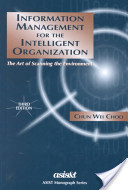The Concept of Information Culture
There are several definitions of information culture. For example, Ginman (1988) sees information culture as a strategic goal that should be planned for as much as the transformation of physical resources. Ginman (1988) defined information culture as the culture in which "the transformation of intellectual resources is maintained alongside the transformation of material resources. The primary resources for this type of transformation are varying kinds of knowledge and information. The output achieved is a processed intellectual product which is necessary for the material activities to function and develop positively" (p. 93 as cited in Choo et al., 2008).
Adrienne Curry and Caroline Moore (2003) are often cited authors in the studies about information culture. In their article Assessing Information Culture - an Exploratory Model, information culture is defined as:
| A culture in which the value and utility of information in achieving operational and strategic success is recognised, where information forms the basis of organizational decision making and Information Technology is readily exploited as an enabler for effective Information Systems (p. 94 cited in Choo et al., 2008). |
